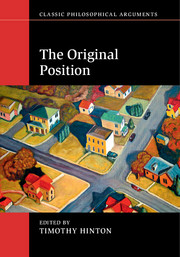Book contents
- Frontmatter
- Contents
- List of contributors
- Acknowledgments
- List of abbreviations
- Introduction: the original position and The Original Position – an overview
- 1 Justice as fairness, utilitarianism, and mixed conceptions
- 2 Rational choice and the original position: the (many) models of Rawls and Harsanyi
- 3 The strains of commitment
- 4 Our talents, our histories, ourselves: Nozick on the original position argument
- 5 Rawls and Dworkin on hypothetical reasoning
- 6 Feminist receptions of the original position
- 7 G. A. Cohen's critique of the original position
- 8 Liberals, radicals, and the original position
- 9 The original position and Scanlon's contractualism
- 10 The “Kantian roots” of the original position
- 11 Stability and the original position from Theory to Political Liberalism
- 12 The original position in The Law of Peoples
- References
- Index
7 - G. A. Cohen's critique of the original position
Published online by Cambridge University Press: 05 December 2015
- Frontmatter
- Contents
- List of contributors
- Acknowledgments
- List of abbreviations
- Introduction: the original position and The Original Position – an overview
- 1 Justice as fairness, utilitarianism, and mixed conceptions
- 2 Rational choice and the original position: the (many) models of Rawls and Harsanyi
- 3 The strains of commitment
- 4 Our talents, our histories, ourselves: Nozick on the original position argument
- 5 Rawls and Dworkin on hypothetical reasoning
- 6 Feminist receptions of the original position
- 7 G. A. Cohen's critique of the original position
- 8 Liberals, radicals, and the original position
- 9 The original position and Scanlon's contractualism
- 10 The “Kantian roots” of the original position
- 11 Stability and the original position from Theory to Political Liberalism
- 12 The original position in The Law of Peoples
- References
- Index
Summary
Introduction
G. A. Cohen seeks to “rescue” justice from, primarily, John Rawls. His challenge to Rawlsian philosophy is widely thought to be one of the most powerful we have. Cohen's writings on this topic over many years culminate in his densely argued volume, Rescuing Justice and Equality. While no thorough evaluation is possible here, I will tentatively defend Rawls, but with reservations.
Rawls's reliance on the original position is at the heart of Cohen's critique, with Cohen charging that this method makes the principles of justice depend on non-moral facts in ways that are fundamentally misguided. Cohen pursues both metaethical and normative prongs of this attack, and I shall be looking at both. On Cohen's view, Rawls's employment of the original position rests on the erroneous assumption that the fundamental principles of justice are fact dependent and, moreover, it leads the content of the principles chosen there to be distorted by categories of non-moral fact that themselves have nothing to do with justice. He argues that both of these shortcomings reveal that the original position method generates a conception of justice that is mistaken because it is less egalitarian than it should be. I will refer to these as the critique of “fact-dependent foundations,” and the critique of “justice as regulation.” I will conclude, briefly, with a discussion of a third form of sensitivity to facts suggested but not developed by Cohen, namely the role that the original position method must give to morally bad facts.
I presume no prior familiarity with Cohen's arguments, though some familiarity with Rawls is taken for granted. The stage can briefly be set with a reminder of what I will call Rawls's original position method. I will sometimes follow Cohen in referring to it as Rawls's “constructivism.” Rawls's seminal development of the argument from the original position stems from the following methodological proposal. Oftentimes, disagreements about what is to be done can be narrowed or settled if the answer is to be provided by a procedure whose authority is less controversial. We might not agree about which restaurant would be the best choice, and yet we might agree that this ought to be decided by voting after discussing it. We don't disagree about that procedure as intractably as we do about which choice would be correct (judged by some procedure-independent standard).
- Type
- Chapter
- Information
- The Original Position , pp. 139 - 158Publisher: Cambridge University PressPrint publication year: 2015



